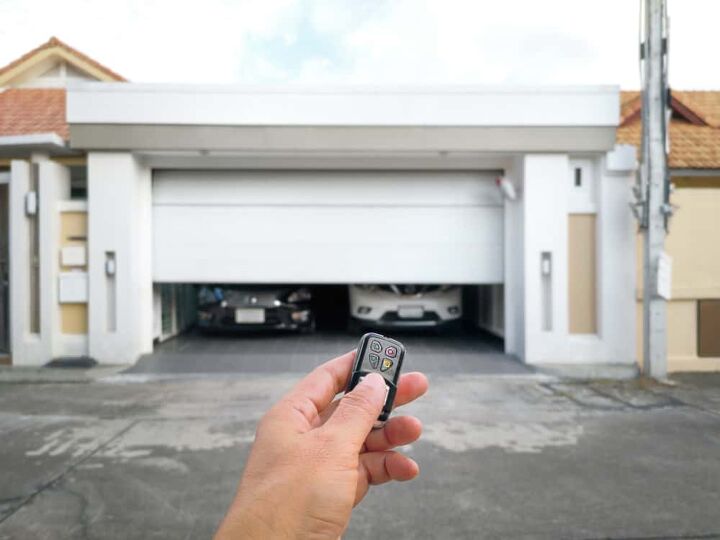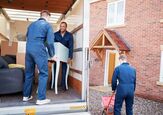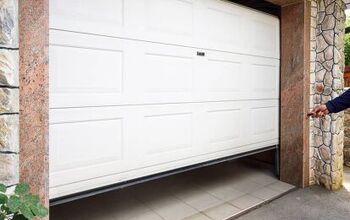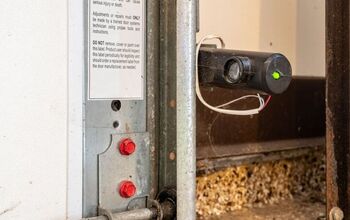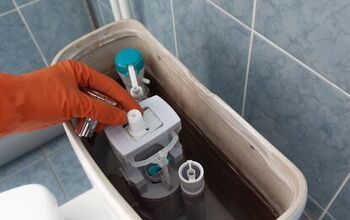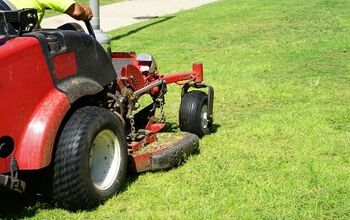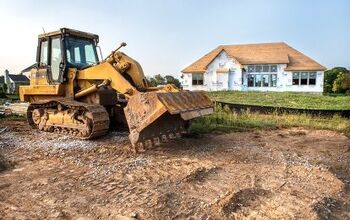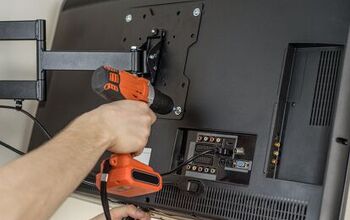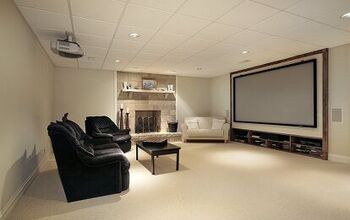Garage Door Won't Close Unless You Hold The Button? (Fix It Now!)

If your garage door begins to have issues closing, there is usually a simple fix. Although this can be frustrating, you may be able to troubleshoot the issue without contacting a repairman.
If your garage door won’t close unless you firmly hold the button, there is probably something wrong with the sensors. The sensors could be dirty, blocked, or faulty. There could also be loose wires at the sensors or the motorhead.
Do You Need a Garage Door Repair Service?
Get free, zero-commitment quotes from pro contractors near you.

Reasons Why the Garage Door Won’t Close
When the garage door doesn’t close, there are a few reasons to evaluate before contacting someone to fix it.
Garage Door Lock-Out Button
One of the most common reasons that the garage door may not close is because the lock-out button is engaged. This button is to prevent the door from opening or closing using the hand-held remote. To determine if this is the issue, press the garage door button on the garage wall. Most wall controls will have a light indicating if the lock-out button is on. If you see that the button is activated, you should disengage it.
Each garage model will have different ways to turn this setting off. Check your garage door manual for your specific model and operation procedures.
Blocked Sensors
Garage doors feature sensors for many reasons. One of those reasons is to prevent the door from crushing anything in its path. If you are struggling to close your garage door without holding down the button, this could be a sensor blockage issue.
The sensor will not activate the garage door to close if there is anything in its way. The blockage may not be noticeable, so check for debris, spider webs, or small rocks in the sensor’s way.
Dirty Sensor Eyes
As mentioned before, every garage door has sensors, and if they are blocked, they will not work. The sensors also will not function properly if they are dirty. You need to clean sensors carefully to ensure they don’t become scratched or damaged.
When cleaning the sensor, keep in mind it is made of glass, similar to a camera lens. To clean it, use a soft rag or cloth and a mild cleaner. The cleaner should be streak-free to reduce further sensor issues. Wipe away any dirt or residue that has become built up on the sensor. The cloth should not be overly wet as this could cause dirt to stick to the sensor more easily.
Sensors Need Alignment
If, after cleaning the sensors and checking for blockage the garage is still malfunctioning, the sensors could be misaligned. The sensors should be pointing in the same direction at the same angle.
If the sensors are not aligned, they won’t register that the other one is there. This will cause the garage door to struggle to close. To fix this problem, you have to realign the sensors.
To realign the sensors, measure the height of each sensor eye from the ground. Use a level to make sure they are pointing directly across from each other at the same angle. A laser level is the best tool to use for this task, and you can find it at Home Depot for about $15.
If you don’t have a laser level, a regular one will work, but it will be a little bit more complicated. Once you have aligned the sensors, test the door to make sure it opens and closes normally.
Loose Wires
Loose wires could be causing your garage door not to close. The first thing to do is check for loose wire connections in the motor unit or near the sensors. The sensors don’t use much voltage, so sometimes the wires aren’t connected properly.
Check your wires for twists or electrical tape. Some installers twist the wires together and then use electrical tape to cover them. If you notice this, you should reconnect the wires with wire connectors. Using blue or gray twist connectors work well to solve this problem.
Garage Door Opener Adjustment
You may need to adjust your garage door opener’s sensitivity settings. First, run a test on the garage door to determine if the sensitivity settings are off. You can contact a professional to run the test or do it yourself if you feel comfortable. To adjust the sensitivity settings, pull the emergency release to disconnect the garage door from the opener. The garage door will close on its own.
Watch to see if it closes equally on each side. If one side of the garage door lags behind the other, contact a professional to complete a sensitivity adjustment. If the garage door seems balanced, sensitivity is not the issue.
Video: Troubleshooting the Issue
Other Common Garage Door Issues
Garage Door Won’t Respond to the Remote
If the garage door stops responding to the wireless remote, there are several solutions to solve this.
- The first solution is to move closer to the garage door. There is a possibility you are out of range. This means that the antenna inside of the garage can’t connect to the remote.
- Be sure that the antenna on the motor unit is hanging downward. Also, check that it is not damaged.
- Check to see if the garage door functions correctly with the wall switch. If it does, you likely need to replace the remote battery.
- After exhausting other options, reprogram the remote control. The remote can be sensitive and sometimes lose its programming. Each remote model has a different way of resetting and programming, so check the manual for instructions on this.
Garage Door Won’t Respond to the Wall Switch
If your garage door isn’t responding to the wall switch, this typically means that power has been lost or disrupted. Try the following solutions to resolve the problem.
- Check to see if the motor unit has been unplugged. Locate the power outlet where the door opener is plugged and confirm that you plug the cord in correctly.
- The circuit breaker or fuse may have tripped on burned out. If other garage lights aren’t operating, you will have to reset the breaker or replace the fuse. If the circuit breaker is repeatedly tripping, there may be a short circuit in the garage or elsewhere.
- There is a possibility that the garage door opener’s motor has burned out. If this is the case, you or a garage repairman will need to replace it.
Garage Door Doesn’t Open Completely
If the garage door opens but then stops short, there are a few possible reasons for this.
- The up-limit switch is a touch-level mounted at the end of the track near the motor unit. If it’s too far away, you will need to move the switch closer to the unit. This is a rare problem, so you will usually notice the issue immediately.
- If the rollers are damaged, this can prevent the garage door from opening completely. To determine if this is the cause, inspect the rollers. You should lubricate any rusted rollers and replace any damaged rollers.
Garage Door Doesn’t Close Completely
If the garage door opens completely but will not close completely, there are three common causes.
- Your garage door has switches that tell the motor when to stop running. The close-limit switch may need to be adjusted if it is preventing the door from closing. Each model is different, so reference your owner’s manual for specific instructions.
- Safety sensors can also cause the door not to close completely. The sensors may need to be adjusted or realigned to create a clear line of view. This will allow the door to close all the way smoothly to the ground.
- Rusted or damaged rollers can prevent the garage door from opening completely as well as closing completely. Replace any damaged rollers or lubricate them with silicone lubricant to resolve the problem. Inspect the tracks and replace them as necessary as they can shift or bend.
Do You Need a Garage Door Repair Service?
Get free, zero-commitment quotes from pro contractors near you.

Related Questions
Will a garage door work without sensors?
Yes, garage doors will work without sensors allowing you to enter or leave the garage. However, the garage door opener will not move the garage door without sensors. To operate the door, you will have to open and close it manually.Each garage door should have a manual release that will allow you to raise and lower it. Activate the emergency release by pulling the cord attached to the trolley on the garage door opener rail. This should release the door from the opener, allowing you to open and close the door as you please.
What is the average lifespan of a garage door opener?
Garage door openers should work reliably for 10 to 15 years. Each garage door model will have a different warranty, but they are typically under warranty for three years. How long your garage door will last depends on climate, usage, quality, and maintenance. If you take the proper precautions with your garage door opener, it can last as long as 30 years. Have your garage door serviced at least once a year as a preventative measure to ensure a long lifespan.
Related Guides

Stacy Randall is a wife, mother, and freelance writer from NOLA that has always had a love for DIY projects, home organization, and making spaces beautiful. Together with her husband, she has been spending the last several years lovingly renovating her grandparent's former home, making it their own and learning a lot about life along the way.
More by Stacy Randall



